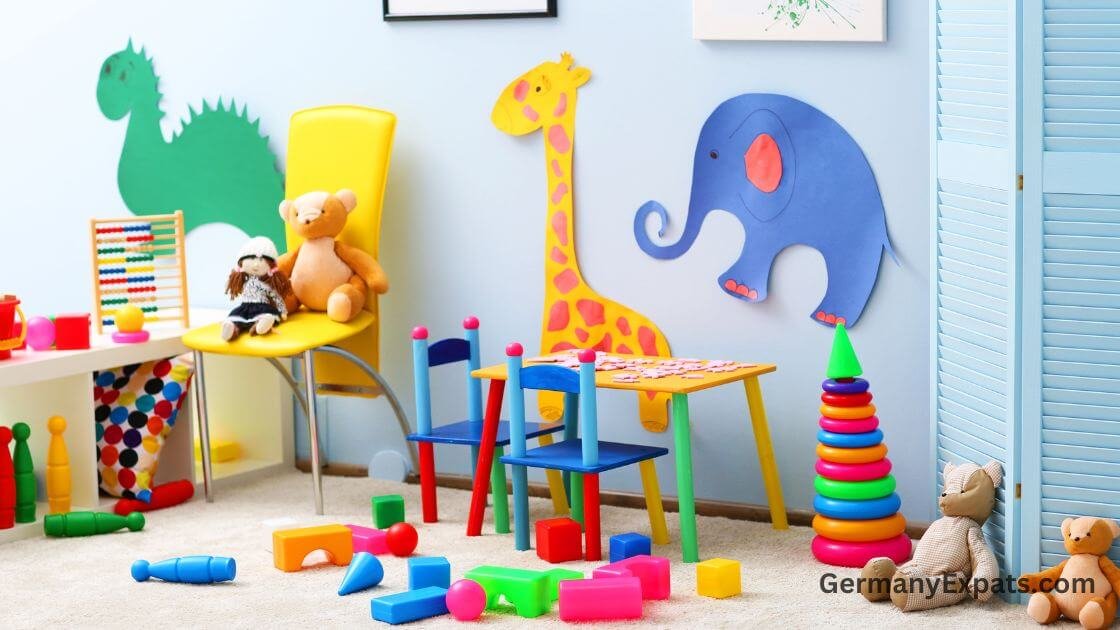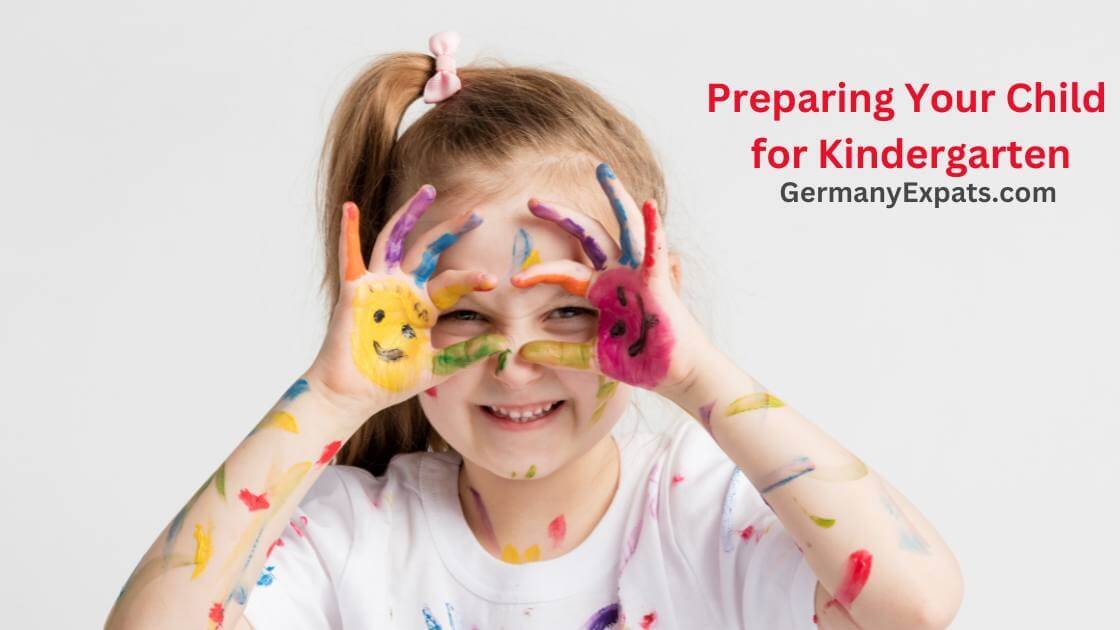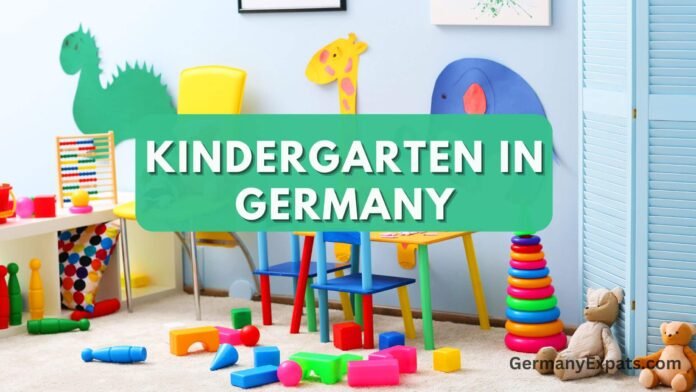Starting kindergarten in Germany can be exciting, but it can also present challenges. The well-organized system focuses on learning through play while helping kids become independent. To make this transition more manageable, you must understand how it works and prepare your child. This guide explains everything expat parents need to know to feel confident. Keep reading for tips and expert advice to ensure your child has a great start!
Table of Contents
1. Understanding the German Kindergarten System
What is Kindergarten in Germany?
Kindergartens in Germany help children aged 3 to 6 grow and learn before starting school. Although not required, they play an essential role in early development. Instead of teaching formal subjects, they encourage creativity, social skills, and Independence. This approach helps children gain confidence and develop a love for learning, building a strong foundation for their future education.
Types of Kindergartens
Germany offers a variety of kindergarten options, catering to different preferences and values:
- Public Kindergartens: Managed by municipalities, these are cost-effective and follow standard curriculums.
- Private Kindergartens: Operated by independent organizations, they often offer unique teaching approaches.
- Waldorf and Montessori Kindergartens: Focused on holistic education, these kindergartens promote experiential and individualized learning.
- Bilingual Kindergartens: Perfect for expat families, they help children become proficient in German while maintaining their native language.
“It’s important to note that the availability of these specialized kindergartens can vary by region. While public, private, Waldorf, Montessori, and bilingual kindergartens are widely available across Germany, options like forest and integrated kindergartens may be more prevalent in certain areas. Therefore, it’s advisable to research local offerings in your region to identify the kindergartens accessible to you.”
How to Find a Kindergarten?

Finding the right kindergarten is crucial. Use online platforms like Kita Finder or visit local education offices for a list of options. Many kindergartens have waiting lists, so starting the application process early is key. This proactive approach can help secure a spot for your child in a preferred kindergarten and reduce the stress of last-minute arrangements.
2. Application and Enrollment Process
Documents Required for Enrollment
To enroll your child in kindergarten in Germany, you will typically need:
- Child’s birth certificate.
- Proof of residence (Meldebescheinigung).
- Vaccination records (Impfpass).
- Application form (available on the kindergarten’s website).
The Waiting List Challenge
German kindergartens often operate with limited slots. To improve your chances:
- Apply to multiple kindergartens.
- Regularly follow up with administrators.
- Consider flexible hours to increase availability.
Costs and Financial Assistance
Public kindergartens get government support, so they cost less, but private ones can be expensive. Many families can get financial help, like the Kindergeld benefit, which gives parents a monthly payment to support their children. To apply for Kindergeld, visit this website. You should also check with your local Jugendamt to see if you qualify for more financial support.
3. Preparing Your Child for Kindergarten

1. Familiarize Your Child with the Environment
Visit the kindergarten together before the start date. Introduce your child to the staff and surroundings to build comfort. Touring the premises allows your child to become comfortable with the new Environment and staff. Familiarity with classrooms and playgrounds can ease their transition immensely. Discuss the daily activities with your child, explaining how fun and engaging the experience will be. These steps reduce anxiety and build anticipation and excitement for starting their kindergarten journey.
2. Establish a Routine
Create a daily schedule mimicking the kindergarten’s routine. This includes meal times, naps, play hours, and structured learning periods. Recreate snack times and group activities to set expectations.
3. Encourage Independence
Teach essential basic skills like putting on and tying shoes, eating with utensils independently, and effectively communicating their needs with words or gestures. Introduce these gradually to boost confidence and adaptability. On shoes, eating independently, and communicating needs.
4. Navigating the First Days
1. The Eingewöhnung Phase
The transition phase, or Eingewöhnung, involves gradual adaptation. Parents typically stay with their child during the first few days to offer reassurance, gradually reducing their presence. This allows the child to build trust with caregivers and become comfortable in the new environment. Open communication between parents and staff is crucial for addressing concerns and ensuring a smooth transition.
It’s important to note that the Eingewöhnung phase can last for two to six weeks. It’s normal for children to experience separation anxiety, mood swings, or clinginess during this time.
2. Handling Separation Anxiety
Reassure your child with positive affirmations. Maintain a calm demeanor to build their confidence in the new Environment.
5. Benefits of Kindergarten in Germany for Expat Families
Kindergarten in Germany offers more than just child care—it is a gateway for expat families to integrate into German society. Children quickly adapt to the language and culture, while parents gain exposure to the local way of life. The system promotes inclusivity, making it easier for families from diverse backgrounds to feel at home.
By embracing this step, you set the foundation for a smooth transition and long-term success. 1. Holistic Development: Play-based activities teach Children problem-solving, teamwork, and emotional regulation.
2. Multicultural Exposure: Many kindergartens host children from diverse backgrounds, enriching cultural understanding and social skills.
3. Language Acquisition: For expat families, bilingual kindergartens offer an excellent platform for children to become fluent in German while preserving their native language.
6. Engaging with Other Parents and the Community
Connecting with other parents at your child’s kindergarten in Germany fosters a sense of community and support. Attend parent meetings and events to build relationships and gain insights into the local education system. Many kindergartens encourage parental involvement, offering opportunities to volunteer or participate in activities. These connections make your family’s experience more rewarding.
1. Consider Location: Proximity to your home or workplace can reduce travel stress and save time.
2. Assess Teaching Philosophy: Visit different kindergartens to understand their teaching methods and facilities.
3. Check Online Reviews: Use platforms like Kita Bewertungen to read insights from other parents.
1. Regular Communication: Stay in touch with teachers through parent-teacher meetings and progress updates.
2. Volunteer Opportunities Participate in events and activities organized by the kindergarten. This strengthens your connection with the community and builds trust with the staff.
7. Choosing the Right Kindergarten
The variety of kindergartens in Germany allows families to pick the one that best suits their child’s needs. Options include public, private, bilingual, and forest kindergartens. Visit several to understand their teaching approaches and facilities. Bilingual kindergartens, for example, can provide an excellent environment for expat children to learn German alongside their native language. Make this decision based on your child’s personality and family’s priorities.
1. Consider Location Proximity to your home or workplace can reduce travel stress and save time.
2. Assess Teaching Philosophy Visit different kindergartens to understand their teaching methods and facilities.
3. Check Online review platforms like Kita Bewertungen to provide insights from other parents.
Conclusion
Starting kindergarten in Germany is a big step for your child. Understanding the system, preparing well, and staying involved can make the experience smooth and enjoyable. Remember, kindergarten is not just about learning—it helps children become independent and build social skills that will help them for years.
FAQs
What age should my child start kindergarten in Germany?
Most children begin at 3, but some kindergartens accept younger children in special programs.
Are bilingual kindergartens standard in Germany?
Yes, many kindergartens, especially in urban areas, offer bilingual programs to cater to expat families.
How can I find financial assistance for kindergarten fees?
Check with your local Jugendamt and apply for kindergarten or other family subsidies.

